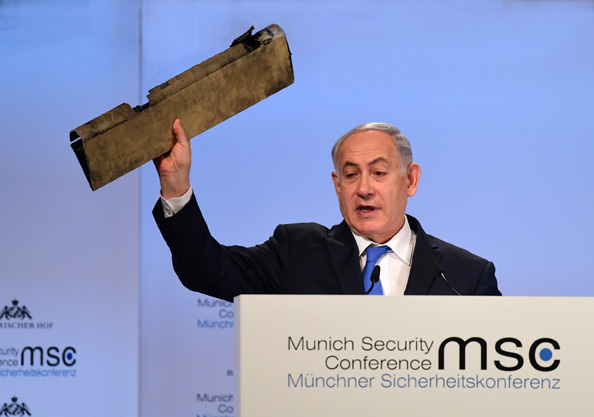Australia/Israel Review
Editorial: Iran – Drones and Deadlines
Feb 28, 2018 | Colin Rubenstein

The cold war between Israel and Iran is heating up. At the same time, the countdown to either “fix or nix” the Iranian nuclear deal is ticking down, with an urgent deadline looming on May 12. These two aspects of the Iranian problem are linked.
On Feb. 10, Israel had its most significant clash with Iran to date, after Israel destroyed an Iranian drone that violated Israeli airspace – an apparent attempt to probe Israeli readiness and resolve from Iran’s increasingly entrenched military assets and bases in Syria.
Israel responded by demonstrating both, sending planes into Syria to strike the “T-4 base”, where the drone originated, as well as other Iranian targets and Syrian air defences – but losing its first plane to enemy fire since 1982 in the process.
This is almost certainly a taste of things to come. Most of Israel’s top military analysts now say it is only matter of time before further violence, probably on a much larger scale, develops between Israel and Iran.
Israel has been warning for some time that it will not allow a permanent Iranian military presence on its border with Syria. Israeli Prime Minister Binyamin Netanyahu had spoken with Russian President Vladimir Putin multiple times to implore him to assist in curtailing Iran’s threatening activities, as well as to US President Donald Trump and anyone else who will listen.
Now that the Assad regime appears firmly in control of most of Syria, thanks to Iranian and Russian support, Iran seems determined to permanently set up shop in Syria with military bases and Iranian Revolutionary Guards on the ground, as well as Shi’ite militias and its Lebanese proxy Hezbollah.
Iran appears ever more confident it will achieve its hegemonic ambitions in the Middle East now that it not only controls four capitals – Damascus, Beirut, Baghdad and Sana’a – but is very close to completing its long-sought land corridor, across Iraq and Syria to the Mediterranean.
There seems little question the current situation is directly linked to the Iranian nuclear deal known as the Joint Comprehensive Plan of Action (JCPOA), signed in 2015 between Iran and the “P5+1” world powers. That agreement was portrayed as stopping Iran from gaining nuclear weapons. Today, not only is it clear that the JCPOA has deep flaws that will likely prevent it achieving that goal, it has actually clearly helped facilitate other Iranian bad behaviours, including the dangerous military entrenchment in Syria.
The flaws of the nuclear deal are becoming ever clearer as key milestones in the agreement draw nearer. By year four (2019), the deal ends the arms embargo on Iran, enabling it to buy and sell weapons on the open market. By year eight, Iran is free to buy and sell ballistic missiles – the key nuclear weapons delivery system. Most concerning, by year 10 to 12 (2025-27), all major restrictions on Iran fade away, giving Iran a green light to build all the nuclear infrastructure it needs for a complete nuclear weapons arsenal.
Meanwhile, the JCPOA has not stopped Iran from working full steam ahead on advanced centrifuges, which will essentially bring Iran’s nuclear breakout time to just weeks, and also launching no fewer than 23 ballistic missile tests. The latter violates the UN Security Council Resolution that implemented the JCPOA, if not the agreement itself.
The JCPOA not only provided Iran with a huge influx of funds – up to US$150 billion – but a period of several years, during both the negotiations and the implementation of the agreement, when the Obama Administration was apparently unwilling to strongly confront or counter Iranian bad behaviour in other spheres for fear of causing Iran to walk away from a deal which was viewed as President Obama’s key “legacy”.
Both the money and the free hand granted over this period were likely essential to the dangerous entrenchment of Iran’s position in Syria – and the strong risk of war with Israel this entails.
The US Trump Administration, whatever its other problems and missteps is right about the serious drawbacks of the JCPOA. President Trump has called the JCPOA the “worst deal ever negotiated” and has announced he will refuse to re-certify the national security value of it to Congress in May. This means the US Congress has until May 12 to reassess, reform and re-issue the terms of the deal. If nothing happens by then, the likelihood is that the US will simply withdraw, with unpredictable results.
Until then, the US is seeking partners from among its allies, likely including Australia, to address the problems with the JCPOA – especially the sunset clauses and Iran’s defiant missiles tests – and to also put in place comprehensive measures to begin to address Iranian regional aggression and other rogue behaviour. This may well entail major new non-nuclear sanctions regarding Iranian terrorism, cyber attacks and human rights abuses, as well as international agreement on how to effectively deter further missile tests.
These issues almost certainly will have been raised with allies including Australian Prime Malcolm Turnbull during his late February US visit, and with European allies, who are reportedly prepared to discuss new measures to supplement and improve the JCPOA. Similarly, it is also in Australia’s core national interests to review our stance to ensure we are constructive and proactive in tackling the extremely serious Iranian problem.
Iranian aggression is not only an issue for Israel, it is a paramount problem for the Arab Sunni world and the international community at large. As North Korea has illustrated, an undemocratic rogue nation with nuclear weapons threatens not only its regional neighbours but constantly destabilises the whole international system. Yet unlike North Korea, Iran is already aggressively moving against its neighbours and destabilising its whole region. Imagine how much worse this situation will become when Iran backs up its quest for hegemony with a protective nuclear umbrella.
Tags: International Security, Iran, Israel, JCPOA






